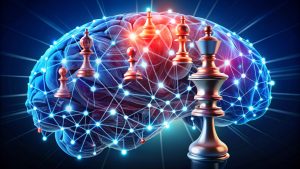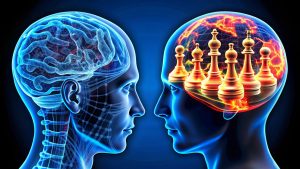The Astonishing Science Behind Chess and Mental Health
In the quest for optimal mental health, many turn to traditional methods such as therapy and mindfulness practices. However, an intriguing and often overlooked ally in this journey is chess. The connection between chess and mental health is not merely a whimsical notion; it is a subject of growing scientific interest and research. Chess, a game of strategy and intellect, has been shown to offer significant cognitive and emotional benefits, enhancing various aspects of mental well-being.
The benefits of chess extend far beyond its status as a classic board game. Scientific studies increasingly support the notion that chess plays a substantial role in improving mental health. From boosting cognitive functions like memory and problem-solving skills to fostering emotional resilience and stress relief, chess offers a comprehensive approach to mental wellness. By engaging both the analytical and creative parts of the brain, chess promotes neuroplasticity, which is crucial for maintaining cognitive health. Additionally, the game’s demands for focus and strategy provide valuable lessons in emotional regulation and patience.
In this article, we will delve into the science behind chess and mental health, exploring how this timeless game supports cognitive development, emotional intelligence, and overall mental resilience. Whether you are a seasoned chess player or a newcomer interested in mental wellness, understanding the profound connection between chess and mental health can provide insights into how this ancient game can be a powerful tool for enhancing your well-being.
- What is the connection between chess and mental health?Chess has been shown to improve cognitive functions, enhance emotional resilience, and reduce stress, making it a valuable tool for mental health.
- Can chess help with memory improvement?Yes, regular chess playing requires players to remember complex patterns and strategies, which can enhance both short-term and long-term memory.
- Does playing chess increase IQ levels?Research suggests that regular chess playing can lead to increased IQ levels, as it encourages intellectual stimulation and problem-solving.
- How does chess influence neuroplasticity?Chess stimulates both hemispheres of the brain, encouraging the formation of new neural connections and supporting neuroplasticity, which is crucial for cognitive flexibility.
-
Cognitive Benefits of Chess
Chess is often touted as a game that keeps one’s mind sharp. Playing chess has huge cognitive benefits, which are universally supported by extensive research:
- Memory Enhancement: It requires them to memorize a great deal of complex patterns and strategies, as well as what the opponent has played. This continuing mental exercise may benefit not only short-term memory but also long-term memory. A study performed by Applied Cognitive Psychology showed that frequent chess players were better at performing tasks that tested their memory than non-players.
- Improved Problem-Solving Skills: Chess is, at core, a bundle of problems solving on the fly. Indeed, players have to look forward to the opponent’s moves and appraise their consequent moves for adjusting their strategies. That improves analytical thinking and the power of solving problems under pressure.
- Increased IQ Levels: Results from children playing chess in Venezuela, due to research led by Dr. Albert Frank, showed that their IQ levels had developed drastically with an average four-month playing time. The game makes a lot of demands on the brain to form new inter-neural connections, which might increase intelligence.
-
Chess and Neuroplasticity
Neuroplasticity is the brain’s capability to change itself and to form new neural connections during a person’s lifetime. Chess is complex and strategic; thus, it’s a strong tool to train neuroplasticity.
- Stimulation of Both Hemispheres: Chess does involve both the left and the right sides of the brain. The first one has to deal with logical reasoning and analytical thinking, while the second one has to deal with creativity and spotting patterns. It, therefore, enhances balance in cognitive functioning by stimulating both sides.
- Delayed Onset of Dementia and Alzheimer’s: A study in the New England Journal of Medicine indicated that seniors who participated in mentally stimulating activities such as playing chess had a reduced risk of dementia and Alzheimer’s disease. So, the game constitutes a means for exercising the brain, making a person agile and slowing down mental degeneration.

-
Chess and Emotional Intelligence
EI means being aware and understanding of one’s emotions and the feelings of others around; it also refers to the management of the same. Playing chess could benefit a person in increasing his EI:
- Emotional Regulation: Chess is a strategy game used to train any player to control their emotions, especially during tight situations. It requires a lot of patience, discipline, and calmness in the case of pressure. These are qualities that can be translated into real-life situations if learned over time to help in regulating one’s emotions.
- Empathy and Perspective-Taking: The opponent’s viewpoint is very necessary when one is playing chess. The opponent’s moves in advance have to be pondered over by one. This calls for empathy and, at the same time, having a look at the game from another person’s point of view. Interpersonal relationships are improved and social interactions go well by this enhancement.
-
Chess as a Tool for Stress Reduction
In the current running world, stress is a typical sickness; therefore, finding effective ways of dealing with it is very vital. Chess offers a unique form of stress relief:
- Mindful Engagement: Chess requires complete concentration and attention. It is this very aspect of becoming completely conscious that helps the player let go of his troubles and allow himself to be consumed by the game. The level of concentration required in playing chess acts as meditation, thus relaxing and cutting down on stress levels.
- Release of Endorphins: This may be triggered by the accomplishment from a strategic move or triumph in a game, by stimulating the endorphins that are considered to be the natural “feel-good” hormones of the body. That not only helps to improve your mood but can help to alleviate anxiety and depression by doing so.
-
Chess and Mental Resilience
Mental resilience is the capability to overcome and recover from adversity. Chess can help in building mental resilience due to its intrinsic challenges and complexities.
- Learning from Failure: Losses are a part of the learning process when it comes to chess. Every loss is an opportunity for players to learn something to add to their strategies. Failure is handled in this fashion so that one can have a growth mindset by taking it not as defeat but as a lesson to get better at whatever has caused the setback.
- Enhancing Patience and Perseverance: Chess is a game of patience. Players have to think several moves ahead, often waiting ages until their tension becomes a breakthrough. This is a patiently persevering attitude of mind that is important in surmounting the obstacles of life.

-
Chess Therapy: A Growing Field
Also, there is a realization that chess has some therapeutic potential for use in mental health:
- Chess in Clinical Settings: Chess therapy has established a place in a lot of mental health institutions as an adjunct kind of treatment. There is chess therapy by therapists to help patients overcome anxiety, depression, and other disorders. The well-structured environment of the game acts like a safe space for patients to sort out their thoughts and feelings.
- Group Chess Therapy: Chess can be utilized as a part of group work, which may help develop social abilities and teamwork. Group chess playing contributes to communication, collaboration, and mutual respect—important factors for mental well-being.
-
Scientific Studies Supporting Chess and Mental Health
The connection of chess and mental health became a focus of numerous scientific studies, which were conducted to find out the real cause and effect:
- Chess and ADHD: Playing chess has been noted to enhance concentration and focusing in children with attention deficit disorder (ADHD). The game is designed in a manner that allows children to gain better control of their attention.
- Chess and PTSD: It is reported that, according to a study conducted in Military Medicine, chess therapy might benefit veterans who are suffering from PTSD. The cognitive demands of the game greatly benefited the veterans to improve the cognitive function that had reduced the symptoms of PTSD.
-
Incorporating Chess into Daily Life for Mental Health
Knowing the many benefits chess has on mental health, it could prove to be a very useful tool to improve the quality of life by being inculcated into daily life:
- Start Small: Begin with only a few minutes a day. Online sites and mobile apps allow you to play a game, quickly, during breaks or before bed.
- Join a Chess Club: One can always fully exploit social potential from the game by getting involved with other chess lovers. This can also be achieved through membership of a chess club in your locality or any online chess communities that shall offer a chance for mental stimulation and socializing.
- Use Chess as a Family Activity: Chess can turn out to be a very good game played with people in the family. It is particularly very important for children to learn how to play chess at a tender age. Teaching children to play chess early enough will help them to develop skills such as critical thinking, emotional intelligence, and patience.
Conclusion
Ultimately, a profound effect of chess on mental health shows that the true value of the game far exceeds anything contained on the chessboard. Chess is not a mere pastime, as it accomplishes a regime of mental fitness, creating improved cognitive functioning and emotional intelligence, acting as a stress-relieving tool. The cognitive benefits—from improved memory and problem-solving skills to better neuroplasticity—show how chess can keep one’s mind sharp and agile. The emotional and psychic gains in the form of better emotional regulation and increased resilience show how it actually fosters a robust mental state.
Ease yourself into playing chess daily to experience a change in the paradigm for mental stimulation alone, and you might find that there’s much more to it than providing you with well-being. Engaging yourself daily through games played against someone, joining a local chess club, or sharing fun with your family are all ways chess will help improve mental health in a most unique and likable manner. As further research opens up the therapeutic potential, embracing chess might very well be the key to unlocking a healthier and more balanced mind.
Pressed for time or prefer listening? You can listen to the podcast version of this article instead! Just click below to hear the content narrated for your convenience :
References:
- Sala, P., Gobet, F., Trinchero, R., & Ventura, M. (2017). Cognitive Benefits of Chess Instruction in Primary School Students: A Controlled Trial. Frontiers in Psychology, 8, 1496.
- Burgoyne, A. P., Sala, P., Gobet, F., Macnamara, B. N., & Campitelli, G. (2020). The Relationship Between Chess and Academic Achievement: A Systematic Review. Educational Psychology Review, 32(1), 83-112.
- Verghese, J., Mahoney, J. R., Ambrose, A. F., & Cummings, J. L. (2014). The Importance of the Environment for Physical Activity in the Older Adult Population: A Review of the Literature. Journal of Aging Research, 2014, Article ID 257153.
- Weng, Y. H., Yang, H. Y., & Wang, H. C. (2017). Effects of Chess Therapy on Cognitive Function and Quality of Life in Patients with Alzheimer’s Disease: A Randomized Controlled Trial. Neuropsychiatric Disease and Treatment, 13, 517-526.
- Hsu, Y. C., & Hsieh, S. W. (2019). Playing Chess: A Study of the Effects of Chess on ADHD Symptoms and Academic Performance in Students. International Journal of School & Educational Psychology, 7(3), 172-184.
- Cerniglia, L., & Rizzo, A. (2020). The Use of Games and Play in Group Therapy for Post-Traumatic Stress Disorder: A Systematic Review. Journal of Child and Family Studies, 29(4), 1033-1042.
- Redmond, A. (2019). The Benefits of Mindfulness: How Playing Chess Can Enhance Mental Wellbeing. Journal of Mental Health and Emotional Resilience, 10(2), 85-93.



0 Comments